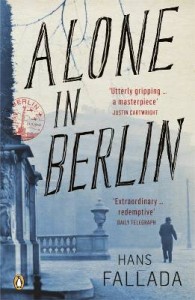 Alone in Berlin (or Every Man Dies Alone) is my book of the year which might seem premature to say in July but I knew this when I read it on holiday in January. So I was absolutely delighted when Simon selected it for our July book group. It’s written by Rudolf Wilhelm Friedrich Ditzen who used the pen-name of Hans Fallada (taken from a Brothers Grimm fairytale). The story is a fictionalised account of Elise and Otto Hampel, a poorly educated working-class couple from Berlin who commenced on a three-year propaganda campaign against the Nazi’s after Elise’s brother was killed in battle. Despite having no previous political activity they dropped cards off around Berlin voicing their discontent, much of which was aimed towards the Winter Fund, a false-front charity that secretly siphoned funds towards the war effort. Their story is one of amazing courage and follows on in the tradition of films such as Sophie Scholl (2005).
Alone in Berlin (or Every Man Dies Alone) is my book of the year which might seem premature to say in July but I knew this when I read it on holiday in January. So I was absolutely delighted when Simon selected it for our July book group. It’s written by Rudolf Wilhelm Friedrich Ditzen who used the pen-name of Hans Fallada (taken from a Brothers Grimm fairytale). The story is a fictionalised account of Elise and Otto Hampel, a poorly educated working-class couple from Berlin who commenced on a three-year propaganda campaign against the Nazi’s after Elise’s brother was killed in battle. Despite having no previous political activity they dropped cards off around Berlin voicing their discontent, much of which was aimed towards the Winter Fund, a false-front charity that secretly siphoned funds towards the war effort. Their story is one of amazing courage and follows on in the tradition of films such as Sophie Scholl (2005).
The book perfectly captures the paranoia of Nazi Germany at the time and how this filtered through every single element of society from the command of the army to the everyday people behind closed doors. Although the subject matter is depressing, Fallada doesn’t dwell on the details and instead moves from one event and character to the next. This means the reader quickly forgets the tragic circumstances of one character and is instantly thrust into the life of the next. In places this had such a dramatic effect on me I found myself re-reading certain chapters, as if attempting to temporarily preserve the lives of the characters for a bit longer.
The key to a good book is simple. You keep turning the page. Fallada is a master storyteller, thrusting you from one life to the next. The pages literally suck you in so that you can smell the characters. This means the reader never has time to reflect on what has just happened and instead is instantly thrust into the next set of circumstances. This is far more effective than say Arthur Koestler’s Darkness at Noon (a previous book group choice) which tries to create claustrophobia on the pages and instead distances the reader by relying on clever narrative devices. Fallada opts for the human story which is why it is so readable.
Which brings me nicely on to my favourite character, the hapless Enno Kluge. Kluge is a cheating, gambling no-good manipulator whose role is that of the ‘joker’. I’ve always had a soft spot for anti-heroes and in this he excels. He rides his luck and escapes situations by the skin of his teeth but he doesn’t learn. He’s bored of working in the factories producing machinery for the war effort and would much prefer to be out gambling and having fun. He has no interest in being assimilated into national propaganda and is so self-obsessed he seems oblivious to what’s going on at times or perhaps his way of coping is simply to block it all out. He infuriates the reader through his disrespect and manipulation of people but eventually he gets his comeuppance. When this happens I had to read the passage again as I was convinced he would escape, that he was faking his death, that the gun must have back-fired. He wasn’t. He was dead.
If you liked this book try out:
- Defying Hitler by Sebastian Haffner
- If Not Now, When? Primo Levi
- The People’s Act of Love James Meek
